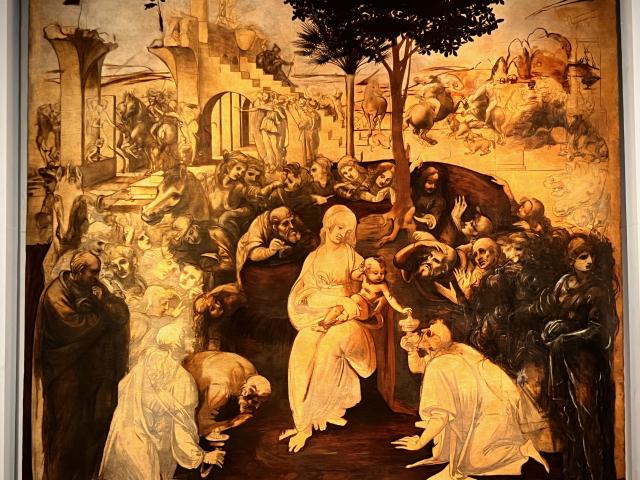Bethlehem, the revered birthplace of Jesus Christ, stands unusually sombre this Christmas season. The usual festive exuberance has been subdued, not by the cold of winter, but by the chilling effects of political and religious strife emanating from the ongoing conflict in Gaza. The Fatah-led Palestinian Authority, wielding its influence in the region, has strongly advised the local Christian community to scale back their Christmas festivities. This recommendation comes amidst what is described as Israel's intense military operations in Gaza, just 50 kilometers away from this historic town.
The town of Bethlehem, nestled in the southern part of Judea, also known as the West Bank, southeast of Jerusalem, has a long-standing tradition of vibrant pre-Christmas celebrations. This year, however, the ongoing conflict in Gaza has cast a long shadow over these festivities. The Palestinian Authority's decision to cancel Christmas celebrations in Bethlehem is seen by many as a continuation of their policies that have, over time, increasingly marginalized the Christian community since assuming control of the area.
Never forget that Palestinians, along with the Syrian Army, once tried to commit a genocide against 100,000 Lebanese Christians.
— ܕܘܝܕ (@realMaalouf) November 29, 2023
In 1980-1981, at the height of the religious-driven Lebanese Civil War, the Syrian Armed Forces, along with the Palestine Liberation Organization,… pic.twitter.com/xcUBhUCcJR
Ibrahim Faltas, a senior Franciscan friar, encapsulates the mood in Bethlehem, remarking, “We have never seen Bethlehem like this, not even during the time of COVID. The town is empty, sad.” This sentiment is echoed by Francesco Patton of the Custody of the Holy Land church group, who announced a more subdued Christmas celebration this year, “without the fanfare and too many lights.”
The impact of the Gaza conflict is felt profoundly in Bethlehem. Since the tragic events of October 7th, where a massacre against Israeli civilians triggered an intense military response, the death toll in Gaza has risen sharply. The Hamas Health Ministry in Gaza puts the number at over 15,000, a figure that is viewed with skepticism due to Hamas's history of exaggerating casualty numbers. This conflict has not only brought grief to the Muslim community in Bethlehem but has also led to a sombre atmosphere enveloping the entire town.
So when does the "Jesus was a Palestinian" silly season start?
— ElBluemountain #BringThemAllHome (@EBluemountain1) December 1, 2023
BTW the Palestinian Authority have cancelled all Christmas celebrations especially in Bethlehem pic.twitter.com/2o4vcoTKwA
The declining Christian presence in Bethlehem is a trend that predates the current conflict. Seventy-five years ago, Bethlehem boasted a predominantly Christian population of approximately 86%, which has dwindled dramatically over the years. The change has been particularly pronounced since the Palestinian Authority took control in 1993, under the Oslo Accords agreement with Israel. Today, the Christian population in Bethlehem has plummeted to approximately 12%, as reported by the city's mayor, Vera Baboun. Many Christians have sought asylum in Israel, escaping the increasing religious tensions and persecution.
The plight of Palestinian Christians is not limited to Bethlehem. Across Palestine, their numbers are shrinking. In the Gaza Strip, for example, the Christian population has decreased significantly since Hamas took control in 2005. From around 5,300 Christians during Israeli control, the number has dropped to about 1,100 in 2020. This exodus is largely attributed to the hostile environment created by years of Islamist rule and repeated conflicts.
This is before 7th of October. About Jerusalem, Israel and Palestine. "The entire planet will be under our law, there will be no more Jews or Christian traitors."
— Herry Rodin (@HerryRodinNapit) December 3, 2023
Ask Iran-backed Hamas leaders in Qatar and Turkey: What do they mean? #Hamas_is_ISIS #HamasislSIS #HamasTerrorrists https://t.co/amEng5zYDT pic.twitter.com/QjVESTluJI
As Christmas nears, the streets of Bethlehem, which once echoed with joyous carols and festive gatherings, are now subdued. The Church of the Nativity, a symbol of Christian heritage, and other churches in the region bear the scars of looting and damage, reflecting the broader struggle of a community under siege. Once a beacon of Christian presence in the Middle East, the Christian community in Palestine now stands at less than 2%, struggling to hold onto their faith and heritage in a land that is increasingly becoming inhospitable to their existence.


